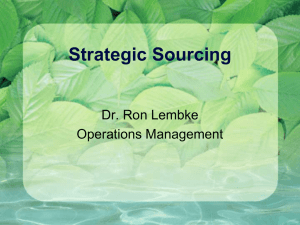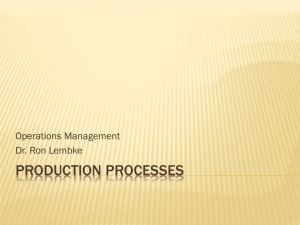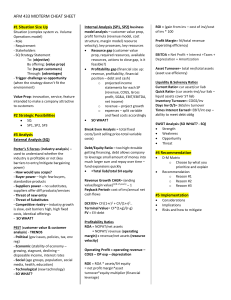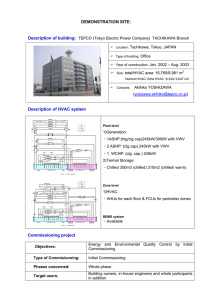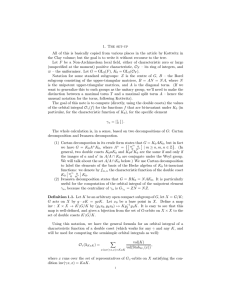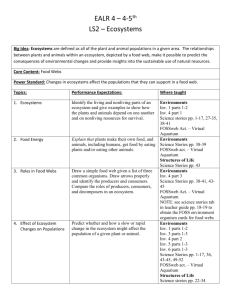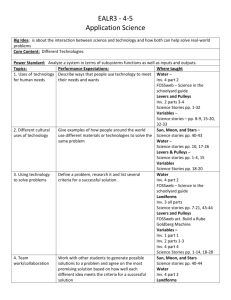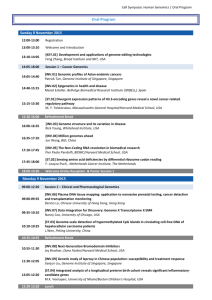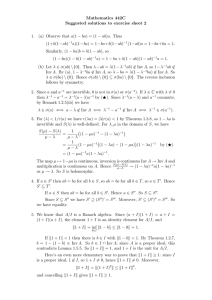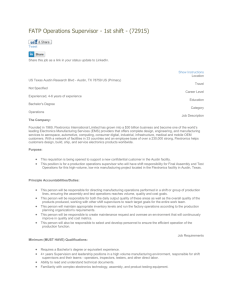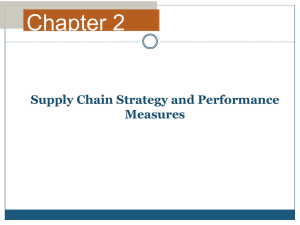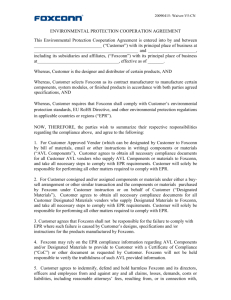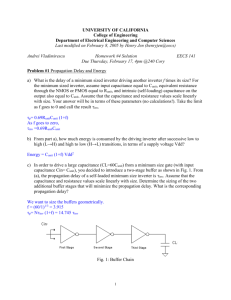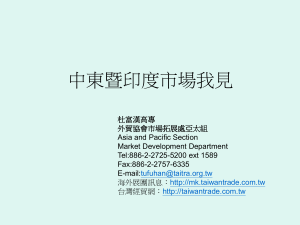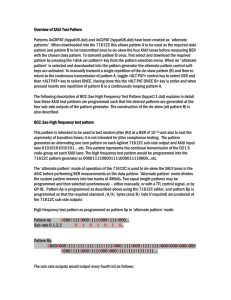Strategic Sourcing - College of Business
advertisement
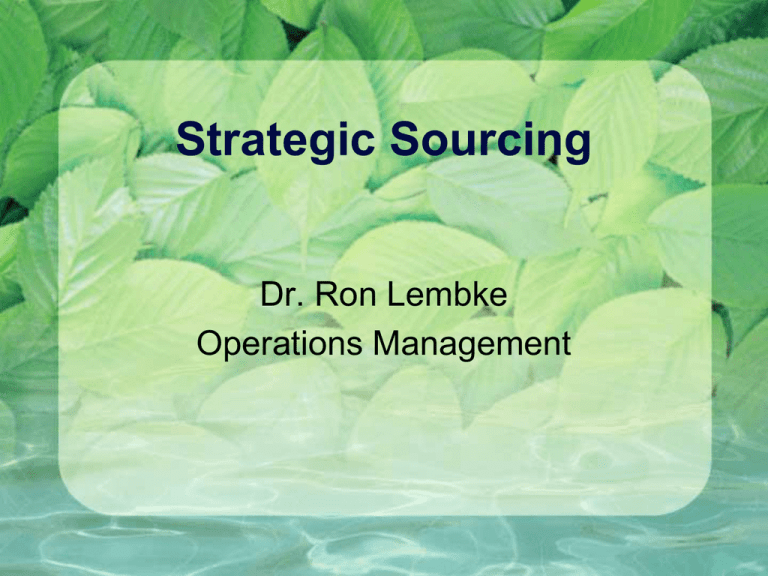
Strategic Sourcing Dr. Ron Lembke Operations Management Old View of the World One company does all processing, from raw material through delivery Vertical Integration Henry Ford’s River Rouge Plant Owned forests, iron mines, rubber plantation, coal mines Ships, railroad lines Dock facilities, blast furnaces, foundries, rolling mills, stamping plants, an engine plant, glass manufacturing, a tire plant, its own power plant, and 90 miles of RR track 1927 Model A Production begins 15,000,000 cars in 15 years 120,000 employees in WWII Supply Network View of the World • Integrated international networks of companies process, produce and distribute products. Spring Hill, Tennessee Saturn Layout Computer Example Wacker Siltronic makes silicon wafers: buy sand grow into long crystals slice into thin wafers Chip Production Chip burned in a $2b “wafer fab” Wafer cut into chips and “packaged” CD Drive Chip stuffed onto board by Flextronics, Celestica, etc. CD drive assembled by separate contract manufacturer Green Printed Circuit Board from different supplier CD drive, with a brand name on it, sold to Gateway Apple and Foxconn EMS elect mfg services Foxconn: Shenzhen, mile square 1 million workers Largest private employer in China 90 million iPhones Global CE industry = $150b Foxconn = 40% = $60b Headline Risk 10 hour days, crowded dorms Terry Gou:Clean, affordable Good food 17 suicides in 10 yrs ¼ rate US college students 9 in March-May 2010 Below national average HK ngo:12hr*13days iPad? Counseling, outsource dorms 10,000 horses galloping Supply Chain Designs Supply Low Uncertainty High Demand Uncertainty Low High Efficient Responsive Risk-Hedging Agile Efficient – economies of scale Risk-Hedging – pooled resources, multiple sources of supply, share inv., need good IT Responsive – Changing consumer needs, mass customization, build-to-order Agile – responsive to changing needs, pooled resources Modular Components Take advantage of modules: parts or products previously prepared Restaurants: prepared ingredients, assembled to order Suppliers can develop new, interesting products to use more quickly, cheaply Variety is gained by different combinations of same components Bullwhip Effect Lack of information sharing can cascade through the supply chain. Small changes at retail level lead to huge swings at manufacturing, like a bullwhip Several retailers order all at once, distributor thinks sales have jumped, orders a much bigger order, etc. Better: sales info shared along “Value Chain.” Graph: Disney & Towill, 2006, Supply Chain Mgt: An Intl J Electronic Data Interchange My computer talks to yours, tells you exactly what I want to order, when You fill out a form, very compressed message sent, viewed as form Software, hardware expensive to implement Sample Purchase Transaction ST88850*1 BEG*00*NE*00498765**010698 PID*X*08*MC**Large Widget P01**5*DZ*4.55*TD CTT*1 SE*1*1 Transaction Set identifier Beginning of Segment Description of Product Baseline Item Data Transaction Totals End of Segment XML e Xtensible Markup Language Perfect for E-Business XML provides self-describing information. Easier to implement or modify than EDI. Expected to eventually, replace EDI, but not nearly as fast as was expected. Standardization through RosettaNet efforts XBRL Standardized set of tags for financial transaction Identifies data as being Q3 EBITDA, 2011, for WidgetCo. No rekeying, fewer errors, easier research 2009 - SEC required for external reporting, 500 largest public cos. XBRL.org Strategic Sourcing Has to be feasible to outsource Assembly line balancing – probably not a step in the middle Figure out what to buy from whom What do we want to accomplish? More effective! More efficient! Continuous Process Improvement? Outsourcing - What is it? Transfer activities to outside providers Outside providers do activities Resources: people, facilities, equipment Decision-making responsibility OEM = Original Equipment Manufacturer name on the product, does not produce Flextronics/Solectron, Foxconn makes it for you Outsourcing – Why do it? Organizationally-driven reasons Focus on what you do best More flexible capacity Employees: career paths Improvement-driven reasons Better quality & productivity, cycle time Gain skills not otherwise available Associate with superior providers Financially-driven reasons Reduce assets, improve ROA Lower fixed costs Cash from selling capital equip. Make or Buy Decision Reasons to Make DIY: Lower cost No capable suppliers Inadequate supply Competitive Issues Core competencies Specialization Reasons to Buy Low purchase cost Lack of capacity Want to gain skill Reduce inv. costs Management focus Patent issues Other Factors Degree of coordination with other activities Relationship-specific investments Easy to copy technologies, or low IP (intellectual properties) protection Second-tier sub-suppliers What to not Outsource Core activities Key to the business Do not confer competitive advantage Strategic activities Key source of competitive advantage X-box – Microsoft never considered making Flextronics in Guadalajara $5 / hr vs. $1 in Doumen, China A CautionaryTale In 1981, IBM ‘PC’. Consumers care about hardware No one cares about the software that lets them talk to the processor. Outsourced the OS to whom? Anybody heard of “Microsoft?” UCSD Pascal $450 CP/M $175 IBM: 2005 Lenovo $1.75b MS: 2010 After Tax $18b MS-DOS $60 Outsourcing in the News The World Is Flat Bandwidth glut of dot-com boom IT & telecommunications changes Nobody can tell you’re calling India White collar jobs – now it’s serious Educated workforces Call centers, programmers Privacy / security concerns Mass Customization Highly customized Integrate design, processes, supply network Supply components cheaply to production points Fast, responsive production, quick delivery Higher weight, lower value Supply Chain Technologies ASN -- lets customer know exactly what has been sent Drop Shipping -- Supplier sends directly to the store, not to store’s warehouse Computer sent to house via UPS 3PL: Third-party Logistics Provider Trucking companies, manage inventories, anything you don’t want to do Managing the Supply Chain Postponement -- withhold any modification until as long as possible. Keep product generic “vanilla” HP Benetton Home Depot paint department Channel Assembly -- have distributor assemble products from components HP Inkjet Printers Printers made in Vancouver, sent via ship through Panama Canal to Europe Europe warehouse stocks inventory by country physically different-- power supply manuals different languages Substitution not allowed Re-supply time very long Euro Plugs No standardized power supplies for Europe Different power supply for every country. HP Inkjet Printers Redesigned printers so that power supply added in Europe Re-engineer product, power supply Assembly done in a warehouse (Quality?) Manuals added in Europe Many expensive changes Store ‘vanilla’ boxes – one pile Piles of power supplies & manuals Cheaper to store than printers Postpone point of differentiation 25% cost reduction Hau Lee, Corey Billington, Brent Carter, Interfaces, 1993 Delayed Customization Before Production Storage After Shipping Storage Benetton Sweaters of undyed wool, dyed once demand is known Dyeing LT much faster than production How many undyed sweaters to make? How many Red, Green, Blue, also, if this production process is cheaper, and you know you’ll sell some minimum amount? Behr Paints Small # of bases Small # tints Unlimited # combinations Keep stock colors on hand? How many gallons? Which ones? Lower labor costs Higher inventory costs Supply Chain Performance Inventory Turnover (turns) = Cost of goods sold / Average inv. Value Annual sales = $3m at cost, avg inv $500k Turns = $3m/$500k = 6.0 Fill Rate = Percentage of orders shipped on time Shipped 1500 orders last month, 1462 left on time, in full Fill Rate = 1462/1500 = 0.9747 Weeks of Supply Weeks of supply (annual avg) = (Avg Inv Value / Annual CoGS )*52 Weeks Annual sales = $30m, CoGS=$25m, Avg Inv = $2.5m Turns = $25m/$2.5m = 10.0 Weeks of Supply = $2.5m/$25m*52=5.2wks Weeks of Supply-Real Time Predicted sales(at cost) over next month Weeks Supply = Current Inventory $ at cost Forecasted Sales per week at cost sales next month=$4m, at cost=$3.2m weekly CoGS=$0.8m Current Inv (at cost) = $2.2m Weeks Supply = $2.2m/$0.8m = 2.75 wks
